Features of self-regulation of socio-cultural deviations of young people
In the youth environment in transition conditions, processes related to the rethinking of life goals and ways of achieving them become more active. In social reality, deviant ways of achieving goals are presented in the form of meanings-judgements, reflecting the principles of separation and self-assertion at the expense of others. In the article they are understood as sociocultural deviations. Their formation in social reality is conditioned by the contradictions forming in society. The self-regulation of sociocultural deviations is understood as a conscious choice by young people in their own self-determination of the principles of dissociation and self-affirmation as optimal, from their point of view, in the emerging conditions of the ways of achieving the goals of life activity. Based on empirical research by the Centre for Sociology of Youth (Institute of Social and Political Research, Federal Research Centre for Sociology, Russian Academy of Sciences), the author considers the peculiarities of self-regulation of socio-cultural deviations of young people depending on their age, place of residence, religious identification, family and trust factor. Young people aged 15-17 are more often oriented in their life activities towards the choice in favour of sociocultural deviations than young people from older age groups. Respondents from low-income groups are more willing to use physical force in a dispute with opponents. In groups in which respondents conceptualise family as an instrumental value, young people are more likely to assert themselves at the expense of others and show disrespect for adults in order to achieve their goals than in groups in which family is conceptualised as a terminal value. Young people who do not trust others are more likely to focus on socio-cultural deviations to achieve their life goals, compared to respondents who build relationships with others on trust.
Figures


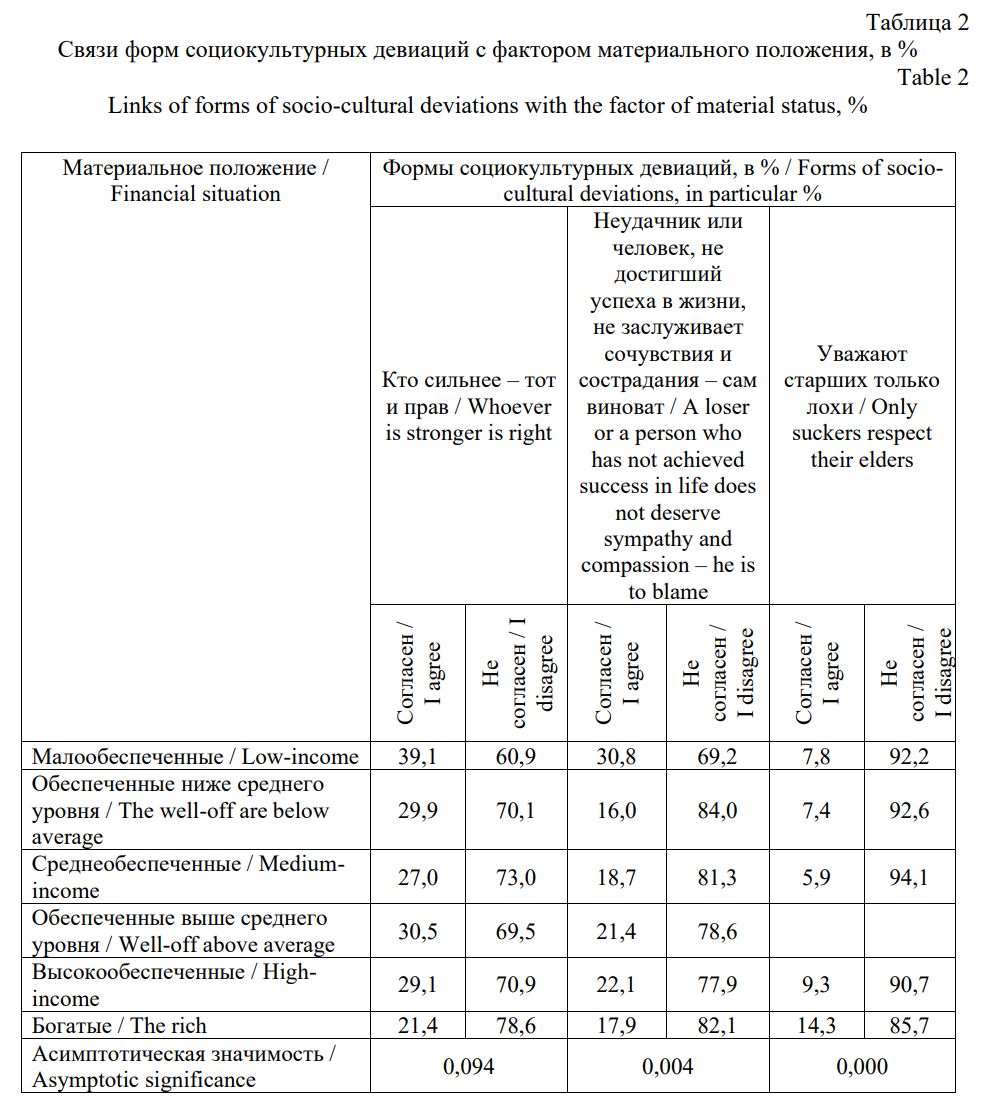
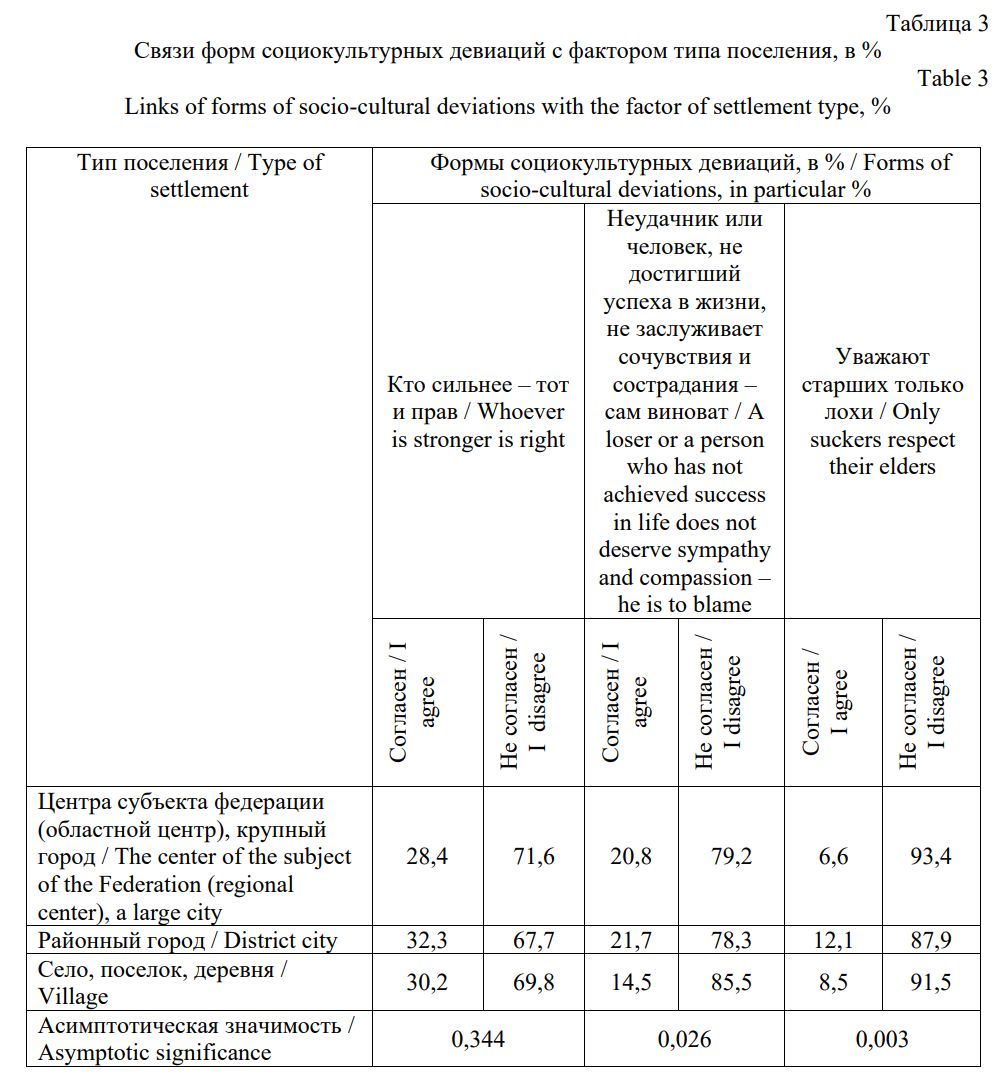

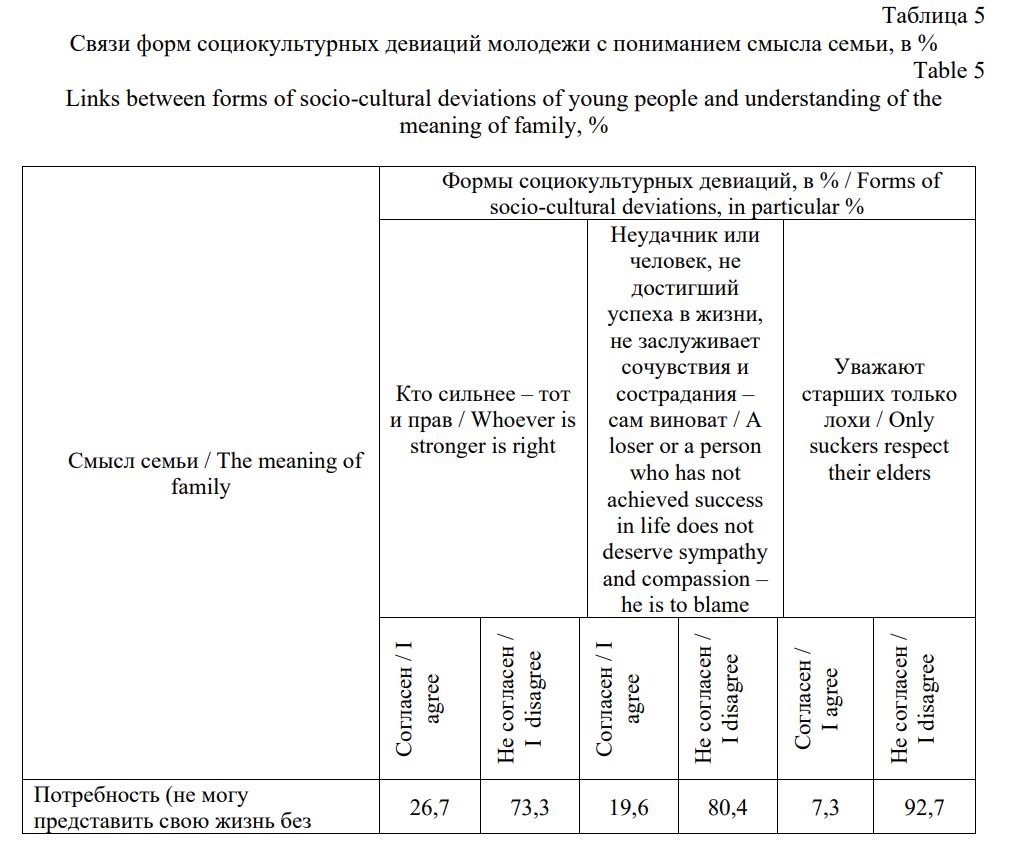
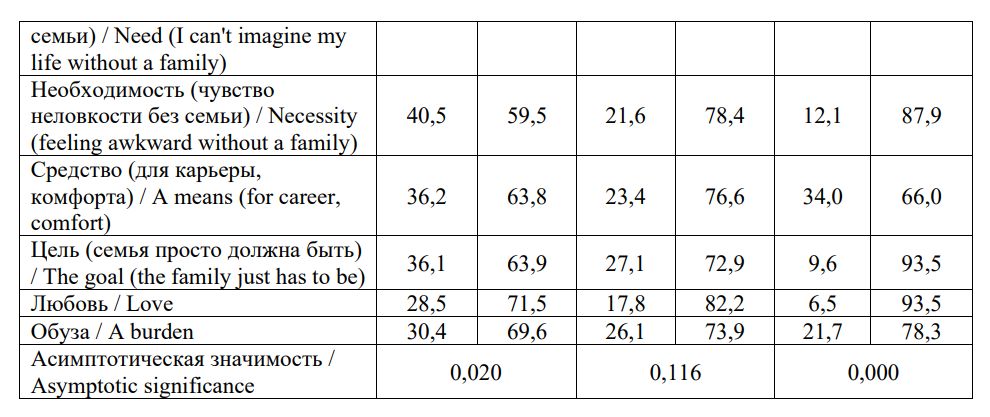
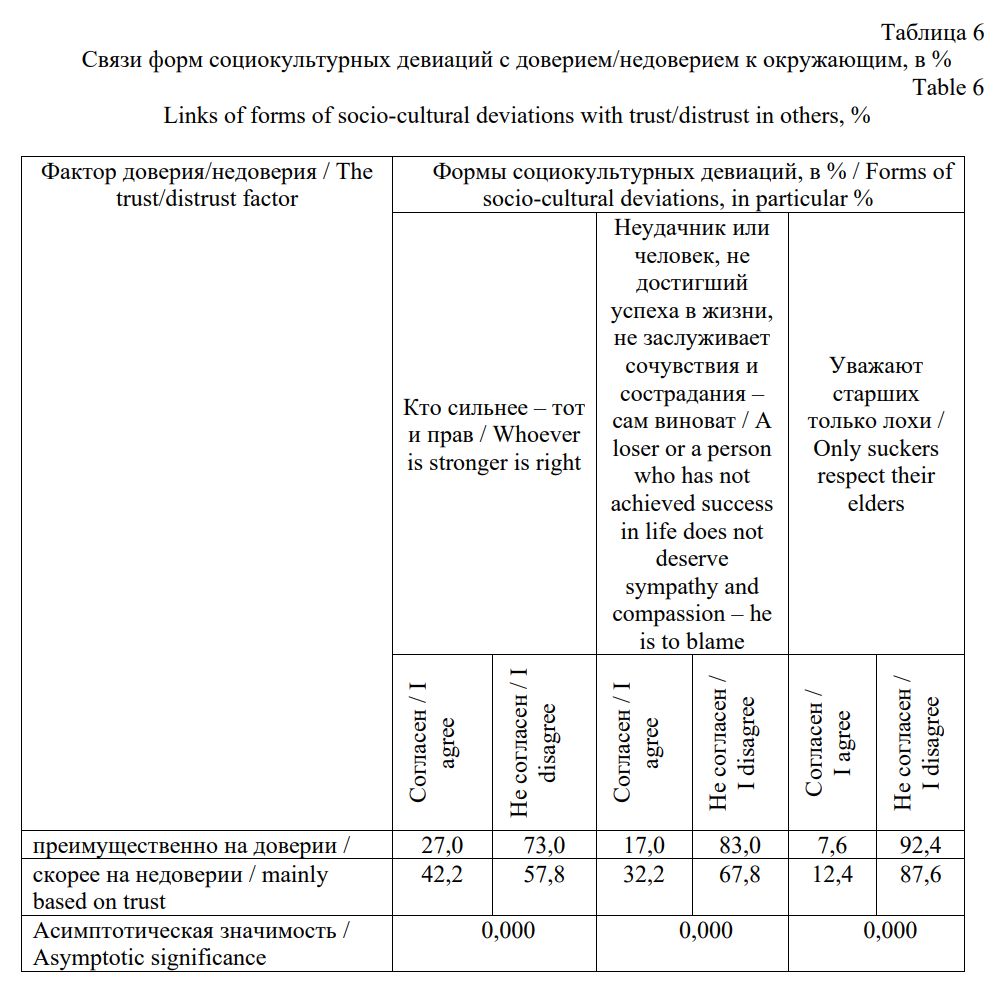
Sorokin, O. V. (2024), “Features of self-regulation of socio-cultural deviations of young people”, Research Result. Sociology and Management, 10 (3), 88-105, DOI: 10.18413/2408-9338-2024-10-3-0-6.


















While nobody left any comments to this publication.
You can be first.
Berger, P., Lukman, N. (1995), Sotsialnoe konstruirovanie realnosti. Traktat po sotsiologii znaniya [The Social Construction of Reality. A treatise on the sociology of knowledge], Medium, Moscow, Russia. (In Russian)
Berdyaev, N. A. (1994), Filosofya svobodnogo dukha [Philosophy of free spirit], Respublika, Moscow, Russia. (In Russian)
Bratus, B. S. (1988), Anomalii lichnosti [Anomalies of personality], Mysl, Moscow, Russia. (In Russian)
Gromyko, M. M. (1991), Mir russkoy derevni [The World of Russian Village], Molodaya Gvardiya, Moscow, Russia. (In Russian)
Gromyko, M. M., Buganov, A. V. (2007), O vozzrenyah russkogo naroda [On the views of the Russian people], Pilgrim, Institute of Ethnology and Anthropology of the Russian Academy of Sciences, Moscow, Russia. (In Russian)
Dostoevsky, F. M. (1891), Zadachi russkogo naroda [Tasks of the Russian people], Public Utility, St. Petersburg, Russia. (In Russian)
Yermolaeva, M. V. (2008), Psikhologya razvitya [Development psychology], MODEK, Moscow, Russia.
Kuznetsov, I. N. (2019), Zhizn russkogo naroda v ego poslovitsah i pogovorkah. Sbornik russkih poslovits i pogovorok [Life of the Russian people in its proverbs and sayings. Collection of Russian proverbs and sayings], Russian civilization, Moscow, Russia. (In Russian)
Kovaleva, A. I. (2020), “Sociocultural subjectivity as the basis of the thesaurus concept of youth”, Horizons of humanitarian knowledge, (1), 36-53. (In Russian)
Leontiev, D. A. (2003), Psikhologya smysla: priroda, stroenie i dinamika smyslovoy realnosti [Psychology of meaning: nature, structure and dynamics of meaning reality], Smysl, Moscow, Russia. (In Russian)
Omelchenko, E. L. (2019), “Is the Russian case of transformation of youth cultural practices unique?”, Monitoring of public opinion: Economic and social changes, (1), 3-27. (In Russian)
Danilyuk, A. Ya. (2010), Osnovy religioznyh kultur i svetskoy etiki. Osnovy svetskoy etiki. 4-5 klassy: uchebnoe posobie dlya obshheobrazovat. uchrezhdeny [Fundamentals of Religious Cultures and Secular Ethics. Fundamentals of Secular Ethics. Grades 4-5: textbook for general educational institutions], Prosveshchenie, Moscow, Russia. (In Russian)
Pitirim Sorokin (2009), Krizis nashego vremeni [The crisis of our time], in Orlova, I. B. (ed.), Moscow, Russia. (In Russian)
Popkova, N. V. (2011), Vvedenie v etiku [Introduction to Ethics], LIBROCOM, Moscow, Russia. (In Russian)
Sorokin, O. V., Lyubutov, A. S. (2023), “Sociocultural deviations of youth in the sphere of interpersonal interactions: self-regulation and modelling”, Nauka. Culture. Society, 29 (3), 98-108. (In Russian)
Oglezneva, N. V. (2008), Sotsialnye riski v sovremennom polikulturnom obshhestve: psikhologicheskie i pedagogicheskie aspekty [Social Risks in Modern Multicultural Society: Psychological and Pedagogical Aspects], Tver State University, Тver, Russia. (In Russian)
Toshchenko, J. T. (2016), “Meaning as a qualitative characteristic of the life world”, Vestnik RSUHU, Series: Philosophy. Sociology. Art History, 2 (4), 9-18. (In Russian)
Chuprov, V. I., Zubok, Yu. A., Romanovich, N. A. (2014), Otnoshenie k sotsialnoy realnosti v rossyskom obshhestve: sotsiokulturny mekhanizm formirovanya i vosproizvodstva [Attitude to social reality in Russian society: a sociocultural mechanism of formation and reproduction], INFRA-M, Moscow, Russia. (In Russian)
Yurevich, A. V. (2011), “‘Asocial socialisation’ as the basis of moral degradation of society”, Bulletin of the Russian Academy of Sciences, 81(1), 3-10. (In Russian)